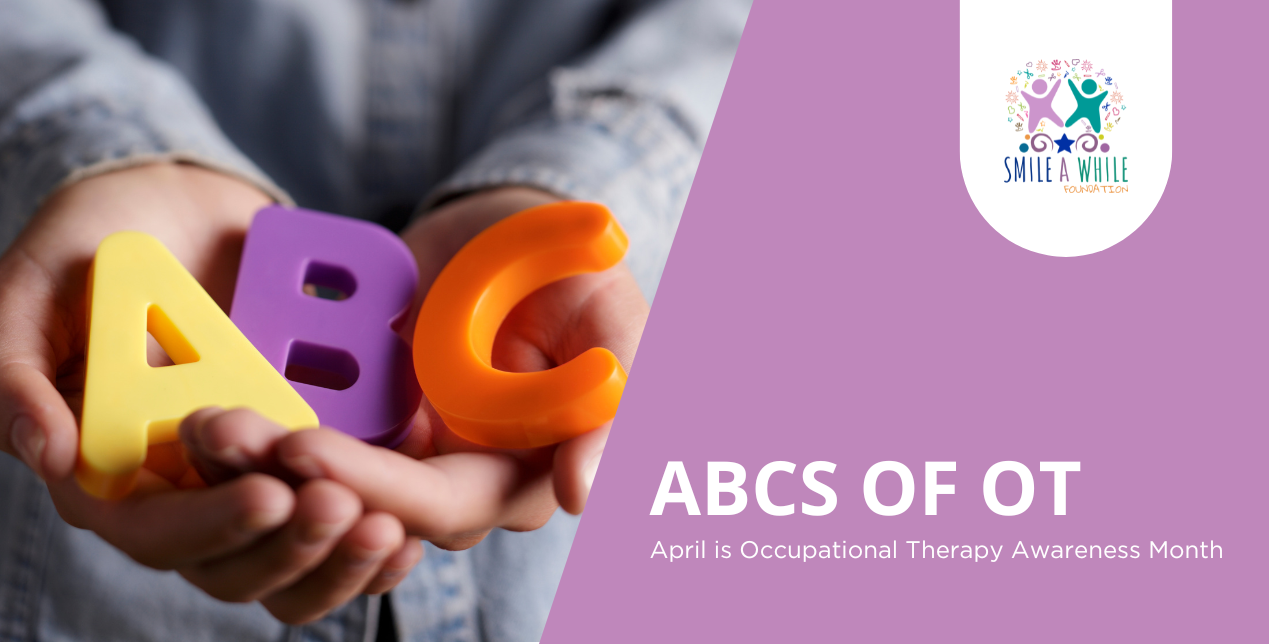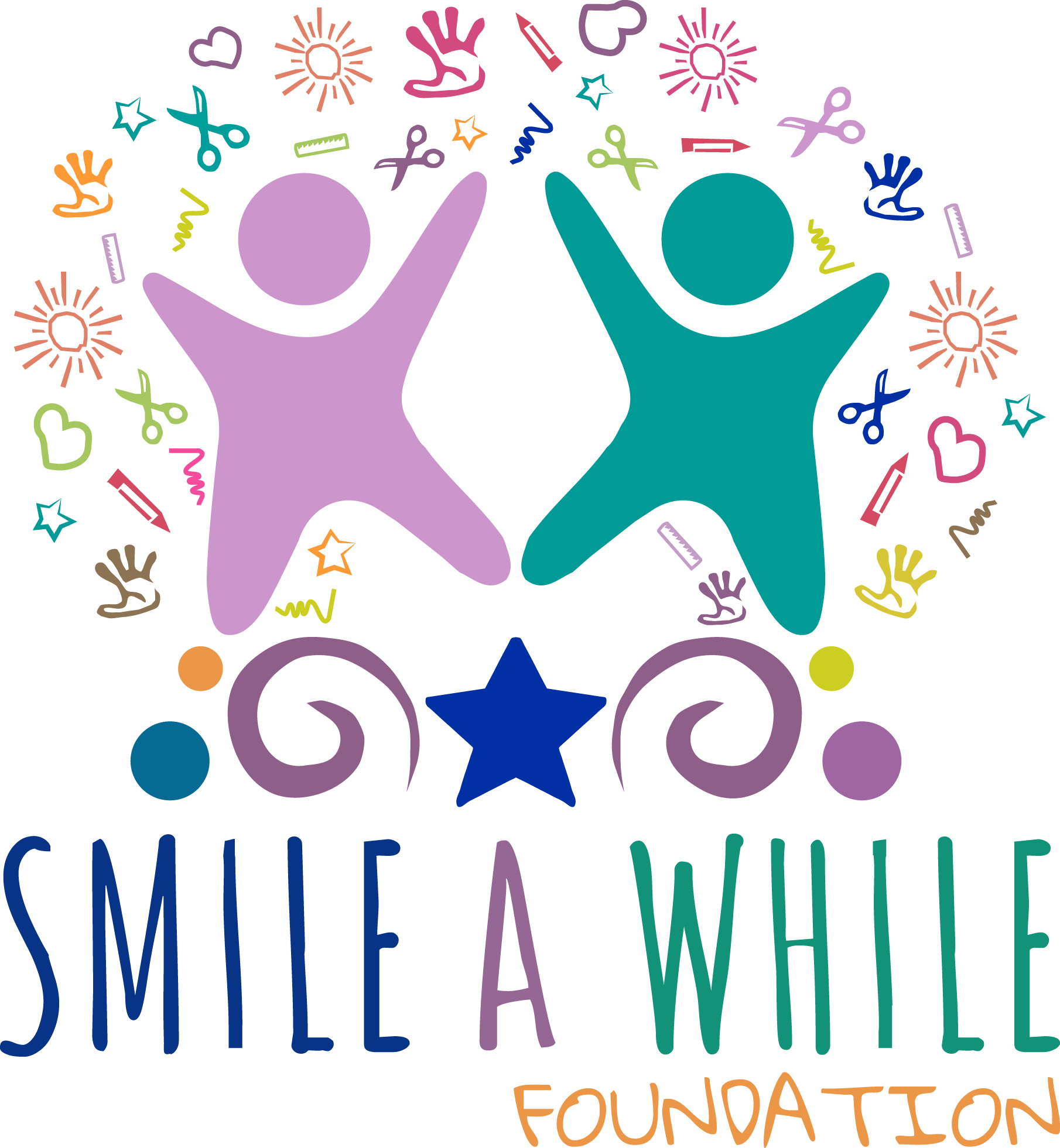ABCs of Occupational Therapy

April is Occupational Therapy Awareness Month
April celebrates Occupational Therapy Month to honor our vital profession and the meaningful differences it makes in the lives of special needs children. Occupational Therapy (OT) is like a superhero for children with special needs, helping them accomplish everyday tasks they struggle with. By finding fun ways to accomplish these tasks, children become more independent and confident in pursuing their dreams.
However, how can we help meet these needs, if Occupational Therapy is not widely known or widely understood? As a way to build understanding of the importance of Occupational Therapy, we are going to participate in the ABCs of OT challenge by using each letter of the alphabet in order to promote #OTMonth.
A is for Access
Access is at the core of what we do. Smile A While is on a mission to provide therapy services to neurodiverse children in areas where access to such support is not widely available. Consistent access to trained professionals is key, and our programs provide training and additional hands on deck to make this happen.
B is for Body Mechanics
Body mechanics refer to the efficient use of one’s body during various activities. Occupational Therapists educate on proper body mechanics to prevent injury and conserve energy. Whether it’s lifting objects, sitting at a desk, or engaging in recreational pursuits, mastering sound body mechanics is crucial for participating in daily life while maintaining physical health and function.
C is for Caribbean
Smile A While Foundation is focused on providing access to Occupational Therapy for special needs children in the Caribbean. Since 2021, we have sent 1 fellow a year to Jamaica, totaling 64 clinic hours and 8 patients seen. With your help, we can grow our operations and expand to other Caribbean nations.
D is for Dream
Our vision at Smile a While is that we believe every child with special needs in the Caribbean can have a bright future when given the support they need. We believe that every child should have the ability to pursue their dreams and access to OT provides this opportunity for special needs children.
E is for ECHO Autism Jamaica
ECHO Autism Jamaica will be able to provide twice a month access to a team of medical professionals who will allow our team to clinically diagnose and make a game plan to care for the child. Our goal is to open our Jamaica ECHO Autism Program in 2024.
F is for Fine Motor Skills
Fine motor skills involve the coordinated movement of small muscles in the hands and fingers. These skills are integral for tasks such as writing, drawing, buttoning clothes, and using utensils. As Occupational Therapists, we are utilizing activities and exercises to help children grasp the possibilities in front of them.
G is for Gross Motor Skills
Much like fine motor skills, coordinating and strengthening large muscle groups throughout the body is also important. Through Occupational therapy we work to coordinate both sides of the body through activities such as catching a ball, getting dressed or crossing the monkey bars. The ability of a child to use their arms and legs in a coordinated way impacts the way they move through the environment.
H is for Health
Health is a state of complete physical, mental and social well-being. Occupational therapy helps people of all ages who have physical, sensory, or cognitive problems regain independence in all areas of their lives in order to maintain a healthy lifestyle.
I is for Integration
Integration of primitive reflexes is important for development. Smile A While is working hard to increase access to therapy resources to help special needs children in Jamaica integrate primitive reflexes. Practicing specific movements can help create new neural pathways. Occupational therapy can be utilized as a primitive reflex integration program to help a child practice specific movement patterns to retrain their brain.
J is for Jamaica
Smile A While supports schools for children with special needs in Jamaica by providing therapists, equipment, and funds for travel and professional development. This critical support can change the trajectory of a child’s life and lead to positive health and quality of life outcomes.
K is for Kinesthetic Learning
Kinesthetic learning, also known as tactile learning, involves acquiring knowledge through physical experiences and hands-on activities. Occupational Therapy embraces kinesthetic learning principles to engage in meaningful therapeutic interventions. Activities such as sensory integration play, promote active participation and skill acquisition.
L is for Life Skills
While we’ve already talked about daily activities, as pediatric occupational therapists, we aim to help kids develop skills they will need as adults. For example, this can include simple meal preparation and other daily life skills.
M is for Mobility Devices
A mobility device is any power-driven mobility device that helps a person with a mobility disability. Examples of mobility devices include wheelchairs, walkers, or standers. Smile A While Foundation was recently gifted the newest model of The Stander by Rifton! The Rifton Stander is truly multi-position stander that can switch easily between prone and supine that provides flexibility and options for our kids to meet the world in an upright position, and participate in daily activities at eye level alongside peers.
N is for Neurodiverse
Neurodiverse is the diversity of all people, but it is often used in the context of autism spectrum disorder (ASD), as well as other neurological or developmental conditions such as ADHD or learning disabilities. We are working to provide neurodiverse children with consistent and accessible therapy to help them live their best lives.
O is for Orthotics
Devices such as splints or braces that provide support, improve function, or prevent injury or contracture in a specific part of the body. These vary widely from shoe inserts or ankle supports to improve gait, to trunk and lower back supports. Smile A While recently hosted our first Splinting Clinic in Jamaica where we were able to train 15 Jamaican medical professionals on how to create custom splints and we donated material to make about 200 custom orthotic splints!
P is for Pediatrics
Occupational Therapy plays a crucial role in pediatric rehabilitation, supporting children’s development and participation in meaningful activities. OT interventions address a wide range of pediatric conditions, including autism spectrum disorder, developmental delays, and sensory processing difficulties. Through play-based therapy, sensory integration techniques, and family-centered approaches, OT promotes children’s functional skills, independence, and social inclusion.
Q is for Quality of Life
At its core, Occupational Therapy is dedicated to enhancing individuals’ quality of life across diverse contexts and circumstances. Whether it’s regaining independence after an injury, adapting to a chronic condition, or navigating life transitions, OT empowers individuals to live fulfilling and meaningful lives. By focusing on strengths, abilities, and aspirations, Occupational Therapy fosters resilience, autonomy, and well-being.
R is for Regulation
Self-regulation is the ability to manage your emotions and behave appropriately. This involves resisting highly emotional reactions, calming yourself down, and having the ability to adjust expectations. For neurodiverse children, sensory spaces can play a key role in self regulation.
S is for Splinting Clinic
At Splinting clinics, children are fitted for custom splints to support individual needs. Custom splinting is essential in providing protection and support that meets individual needs for optimal quality of life. Custom splinting or bracing can provide additional comfort and mobility that will not exist from hand-me-down products, which is a huge reason we are excited to be able to bring this to kids in Jamaica. Smile A While Foundation hosted our first Spinting Clinic in April 2023.
T is for Trained Professionals
Occupational Therapists are trained professionals as it requires special training to become a certified OT. There are currently less than ten occupational therapists working in Jamaica, according to the Association of Caribbean Occupational Therapists. Access to training matters in order to be able to provide therapy services to kids.
U is for Underlying Skills
Occupational therapists are experts in deciding what underlying skills are impacting a child’s ability to engage in a specific task! Occupational therapists then design treatment activities to address these skills.
V is for Vestibular System
The vestibular system is one of the eight sensory systems. This system is all about movement! Some children may be very sensitive to vestibular (movement) sensations, making things like car rides or playing on a playground difficult. Other children may seek out vestibular input by spinning, crashing, or climbing in a way that interferes with participating in other activities. Regardless of the situation, occupational therapists help design interventions to improve vestibular processing.
W is for Whole Person Care
Whole-person care is the patient-centered optimal use of diverse healthcare resources to deliver the physical, behavioral, emotional, and social services required to improve care coordination, well-being, and health outcomes while respecting patients’ treatment choices. When we provide therapy that address the whole person, we are developing lifestyles and habits that will last a lifetime.
X is for eXercise
Occupational therapy can assist in helping individuals discover activities they enjoy. By making exercise fun, individuals are more likely to incorporate activities into their daily lives to achieve their goals, and help them improve strength, endurance, and flexibility.
Y is for Yoga
Yoga is a practice that connects the body, breath, and mind. It uses physical postures, breathing exercises, and meditation to improve overall health. Yoga in an OT setting helps children to regulate and connect their mental, physical, and spiritual selves.
Z is for Zippers
Learning how to manipulate a zipper can be very tricky because of the fine motor skills, visual motor skills, and bilateral coordination skills required for this goal! Occupational therapists can help kids learn to complete this task!
Support Access to OT in Jamaica
Check out all of the programs that currently need support in order for us to increase consistent access to occupational therapy for special needs children in Jamaica.

